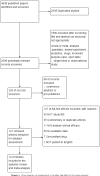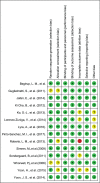Efficacy of different probiotic protocols in irritable bowel syndrome: A network meta-analysis
- PMID: 31277101
- PMCID: PMC6635271
- DOI: 10.1097/MD.0000000000016068
Efficacy of different probiotic protocols in irritable bowel syndrome: A network meta-analysis
Abstract
Background: Probiotics is a prevalence therapeutic method for irritable bowel syndrome (IBS), but there is lack of comparison in different protocols. We aim to differentiate the reasonable protocols by assessing the efficacy and safety through the combined way of traditional and network meta-analysis.
Method: PubMed, Medline, EMBASE, Web of Science, and Cochrane Central Register of Controlled Trials databases were searched from January 2006 to April 2019. The relative risk (RR) with a 95% confidence interval (CI) was used to combine dichotomous data of responders.
Result: Among 14 studies included 1695 patients were identified as suitable for inclusion. The proportion of responders was associated with the administration of multispecies probiotics (RR: 1.39; 95% CI: 1.19-1.61) and the dose of 10∼10 (RR: 2.08; 95% CI: 1.59-2.71). In network meta-analysis, the protocol of DUO had a significant effect for diarrhea type of IBS compared with placebo (RR: 7.46; 95% CI: 2.00-32.23). In the rest of 4 protocols, no significant difference was found in each other except F19 which appears inferior when compared with Pro (RR: 0.16; 95% CI: 0.03-0.88). Meanwhile, Pro showed a superior effect for undifferentiated-type IBS compared with placebo (RR: 7.16; 95% CI: 1.72-29.89). No probiotics-associated severe adverse event was reported in included studies.
Conclusion: Probiotics is a safety choice to improve the overall symptoms for IBS patient. The protocols with suitable dose combined of Lactobacillus and Bifidobacterium can have prepotent effects compared with single species or over-dosage protocols. Network meta-analysis shows that DUO may be the first recommendation for diarrhea-type IBS. In the remaining 4 regimes of this study, Pro has a high rank for undifferentiated-type IBS.
Conflict of interest statement
The authors report no conflicts of interest
Figures







Similar articles
-
Effects of probiotic type, dose and treatment duration on irritable bowel syndrome diagnosed by Rome III criteria: a meta-analysis.BMC Gastroenterol. 2016 Jun 13;16(1):62. doi: 10.1186/s12876-016-0470-z. BMC Gastroenterol. 2016. PMID: 27296254 Free PMC article.
-
The effect of a multispecies probiotic mixture on the symptoms and fecal microbiota in diarrhea-dominant irritable bowel syndrome: a randomized, double-blind, placebo-controlled trial.J Clin Gastroenterol. 2012 Mar;46(3):220-7. doi: 10.1097/MCG.0b013e31823712b1. J Clin Gastroenterol. 2012. PMID: 22157240 Clinical Trial.
-
The efficacy and safety of probiotics in patients with irritable bowel syndrome: Evidence based on 35 randomized controlled trials.Int J Surg. 2020 Mar;75:116-127. doi: 10.1016/j.ijsu.2020.01.142. Epub 2020 Jan 31. Int J Surg. 2020. PMID: 32014597
-
Efficacy of probiotics, prebiotics and synbiotics in irritable bowel syndrome: a systematic review and meta-analysis of randomized, double-blind, placebo-controlled trials.J Med Microbiol. 2023 Sep;72(9). doi: 10.1099/jmm.0.001758. J Med Microbiol. 2023. PMID: 37772692
-
Effect of probiotic species on irritable bowel syndrome symptoms: A bring up to date meta-analysis.Rev Esp Enferm Dig. 2013 Jan;105(1):19-36. doi: 10.4321/s1130-01082013000100005. Rev Esp Enferm Dig. 2013. PMID: 23548007
Cited by
-
Effects of Microencapsulated Sodium Butyrate, Probiotics and Short Chain Fructooligosaccharides in Patients with Irritable Bowel Syndrome: A Study Protocol of a Randomized Double-Blind Placebo-Controlled Trial.J Clin Med. 2022 Nov 7;11(21):6587. doi: 10.3390/jcm11216587. J Clin Med. 2022. PMID: 36362815 Free PMC article.
-
Strain-specific and outcome-specific efficacy of probiotics for the treatment of irritable bowel syndrome: A systematic review and meta-analysis.EClinicalMedicine. 2021 Oct 18;41:101154. doi: 10.1016/j.eclinm.2021.101154. eCollection 2021 Nov. EClinicalMedicine. 2021. PMID: 34712929 Free PMC article.
-
Interactions between the Gut Microbiome, Lung Conditions, and Coronary Heart Disease and How Probiotics Affect These.Int J Mol Sci. 2021 Sep 8;22(18):9700. doi: 10.3390/ijms22189700. Int J Mol Sci. 2021. PMID: 34575864 Free PMC article. Review.
-
Resveratrol Favors Adhesion and Biofilm Formation of Lacticaseibacillus paracasei subsp. paracasei Strain ATCC334.Int J Mol Sci. 2020 Jul 30;21(15):5423. doi: 10.3390/ijms21155423. Int J Mol Sci. 2020. PMID: 32751457 Free PMC article.
-
Anti-Helicobacter pylori treatment can effectively improve the clinical remission rates of irritable bowel syndrome: a controlled clinical trial meta-analysis.Clinics (Sao Paulo). 2020 Nov 11;75:e1857. doi: 10.6061/clinics/2020/e1857. eCollection 2020. Clinics (Sao Paulo). 2020. PMID: 33206753 Free PMC article.
References
-
- Lovell RM, Ford AC. Global prevalence of and risk factors for irritable bowel syndrome: a meta-analysis. Clin Gastroenterol Hepatol 2012;10:712.e4–21.e4. - PubMed
-
- Rousseaux C, Thuru X, Gelot A, et al. Lactobacillus acidophilus modulates intestinal pain and induces opioid and cannabinoid receptors. Nat Med 2007;13:35–7. - PubMed
Publication types
MeSH terms
LinkOut - more resources
Full Text Sources
Miscellaneous

